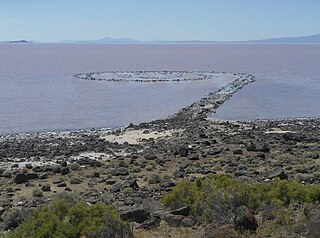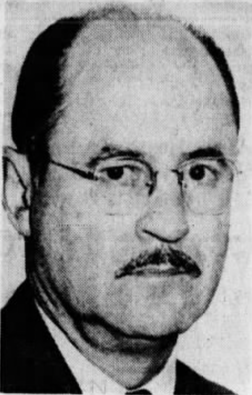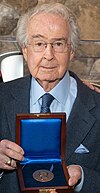
The Smithsonian Institution, or simply the Smithsonian, is a group of museums, education and research centers, the largest such complex in the world, created by the U.S. government "for the increase and diffusion of knowledge." Founded on August 10, 1846, it operates as a trust instrumentality and is not formally a part of any of the three branches of the federal government. The institution is named after its founding donor, British scientist James Smithson. It was originally organized as the United States National Museum, but that name ceased to exist administratively in 1967.

James Smithson was a British chemist and mineralogist. He published numerous scientific papers for the Royal Society during the early 1800s as well as defining calamine, which would eventually be renamed after him as "smithsonite". He was the founding donor of the Smithsonian Institution, which also bears his name.

Michael "Mike" Collins was an American astronaut who flew the Apollo 11 command module Columbia around the Moon in 1969 while his crewmates, Neil Armstrong and Buzz Aldrin, made the first crewed landing on the surface. He was also a test pilot and major general in the U.S. Air Force Reserve.

The National Mall is a landscaped park near the downtown area of Washington, D.C., the capital city of the United States. It contains and borders a number of museums of the Smithsonian Institution, art galleries, cultural institutions, and various memorials, sculptures, and statues. It is administered by the National Park Service (NPS) of the United States Department of the Interior as part of the National Mall and Memorial Parks unit of the National Park System. The park receives approximately 24 million visitors each year. Designed by Pierre L'Enfant, the "Grand Avenue" or Mall was to be a democratic and egalitarian space—the complete opposite of the gardens of Versailles where only royalty and nobility accessed similar spaces in size and scope.
Brutalist architecture is an architectural style that emerged during the 1950s in the United Kingdom, among the reconstruction projects of the post-war era. Brutalist buildings are characterised by minimalist constructions that showcase the bare building materials and structural elements over decorative design. The style commonly makes use of exposed, unpainted concrete or brick, angular geometric shapes and a predominantly monochrome colour palette; other materials, such as steel, timber, and glass, are also featured.

David Nathaniel Baker Jr. was an American jazz composer, conductor, and musician from Indianapolis, as well as a professor of jazz studies at the Indiana University Jacobs School of Music. Baker is best known as an educator and founder of the jazz studies program. From 1991 to 2012, he was conductor and musical and artistic director for the Smithsonian Jazz Masterworks Orchestra. He has more than 65 recordings, 70 books, and 400 articles to his credit.

Spiral Jetty is a work of land art constructed in April 1970 that is considered to be the most important work of American sculptor Robert Smithson. Smithson documented the construction of the sculpture in a 32-minute color film also titled Spiral Jetty. Built on the northeastern shore of the Great Salt Lake near Rozel Point in Utah entirely of mud, salt crystals, and basalt rocks, Spiral Jetty forms a 1,500-foot-long (460 m), 15-foot-wide (4.6 m) counterclockwise coil jutting from the shore of the lake.
The year 1802 in science and technology involved some significant events, listed below.
The year 1964 in architecture involved some significant architectural events and new buildings.

The National Museum of Natural History (NMNH) is a natural history museum administered by the Smithsonian Institution, located on the National Mall in Washington, D.C., United States. It has free admission and is open 364 days a year. With 4.4 million visitors in 2023, it was the second most-visited museum in the United States.

Nathaniel Charles Jacob Rothschild, 4th Baron Rothschild,, was a British peer, investment banker and member of the Rothschild banking family. Rothschild held important roles in business and British public life, and was active in charitable and philanthropic areas.

The National Museum of the American Indian–New York, the George Gustav Heye Center, is a branch of the National Museum of the American Indian at the Alexander Hamilton U.S. Custom House in Manhattan, New York City. The museum is part of the Smithsonian Institution. The center features contemporary and historical exhibits of art and artifacts by and about Native Americans.

Cooper Hewitt, Smithsonian Design Museum is a design museum at the Andrew Carnegie Mansion in Manhattan, New York City, along the Upper East Side's Museum Mile. It is one of 19 Smithsonian Institution museums and one of three Smithsonian facilities located in New York City, along with the National Museum of the American Indian's George Gustav Heye Center in Bowling Green and the Archives of American Art New York Research Center in the Flatiron District. Unlike other Smithsonian museums, Cooper Hewitt charges an admissions fee. It is the only museum in the United States devoted to historical and contemporary design. Its collections and exhibitions explore design aesthetic and creativity from throughout the United States' history.

The Smithsonian American Art Museum is a museum in Washington, D.C., part of the Smithsonian Institution. Together with its branch museum, the Renwick Gallery, SAAM holds one of the world's largest and most inclusive collections of art, from the colonial period to the present, made in the United States. More than 7,000 artists are represented in the museum's collection. Most exhibitions are held in the museum's main building, the Old Patent Office Building, while craft-focused exhibitions are shown in the Renwick Gallery.

Warren Winiarski was an American Napa Valley winemaker and the founder and proprietor of Stag's Leap Wine Cellars.
Events from the year 1829 in the United States.

The National Museum of African American History and Culture (NMAAHC), colloquially known as the Blacksonian, is a Smithsonian Institution museum located on the National Mall in Washington, D.C., in the United States. It was established in 2003 and opened its permanent home in 2016 with a ceremony led by President Barack Obama.
The Langley Gold Medal, or Samuel P. Langley Medal for Aerodromics, is an award given by the Smithsonian Institution for outstanding contributions to the sciences of aeronautics and astronautics. Named in honor of Samuel P. Langley, the Smithsonian's third Secretary, it was authorized by the Board of Regents in 1909.

Edgar Preston Richardson, also known as E. P. Richardson, was an American art historian, museum director, author, and curator. Richardson served as director of the Detroit Institute of Arts (1945–1962) and Winterthur Museum (1963–1966). He authored seven books, served on the boards of the Pennsylvania Academy of the Fine Arts (1966–1977) and other arts organizations, and co-founded the Archives of American Art at the Smithsonian in 1954.





















